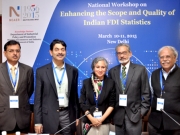With the Government’s ‘Make in India’ programme generating considerable interest from an expanding array of international investors, India is likely to see a spurt in foreign direct investment over the next few years.
In strengthening India’s position as one of the world’s Top 15 FDI host economies, it is imperative for the country to further deepen its policy and research understanding of the quantum, source and distribution of FDI inflows but, most crucially, of their economic and developmental impact. It is also important to enhance India’s understanding of the FDI potential, competitiveness and performance of individual states and cities through a more holistic mapping of foreign investor activity on the ground.
More detailed FDI statistics are core to this effort. For this reason, it is timely to begin to consider how India might further strengthen its foreign direct investment-related data, as part and parcel of its ongoing effort to identify and address statistical gaps on a variety of principal economic indicators.
Against this backdrop, NCAER, with Department of Industrial Policy and Promotion as its Knowledge Partner, organized a national workshop on 10-11 March 2015, entitled Enhancing the Scope and Quality of Indian FDI Statistics, at the Indian International Centre (Conference Room 1), New Delhi. The objective of this workshop was to share the results of background work done by NCAER on improving India’s FDI statistics, and to bring together government agencies at the central and state level, the RBI, and Indian FDI researchers in one location to discuss the current gaps in Indian FDI statistics and to collectively suggest potential enhancement both in the better production and dissemination of FDI data and in their use for policy purposes, particularly at the state level.
NCAER also invited FDI officials from the United Nations Conference on Trade and Development (UNCTAD), Geneva who brought an international expert perspective to the workshop. These officials familiarized participants with the latest international standards and best practice in FDI statistics collection, analysis and reporting; measuring the developmental outcomes of foreign direct investor activity, including global value chains and non-equity modes; and in determining the FDI potential, competitiveness and performance of states and cities.






























